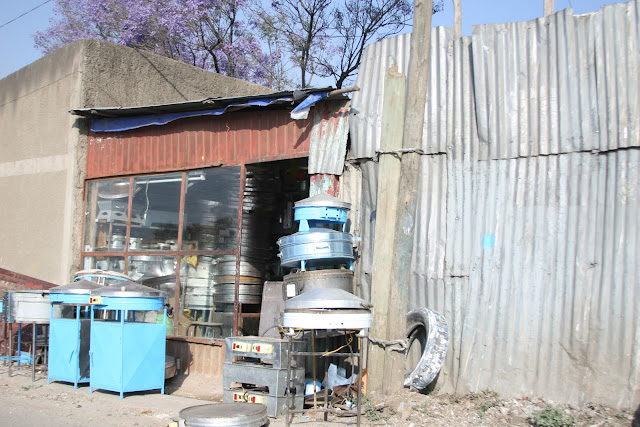he major industries produce food, beverages, processed tobacco, plastics, chemical products, textiles, and shoes. The city is also the center of the nation's service and finance sectors. Addis Ababa has a large tourist industry. It is the hub of a highway network and a terminus of a railroad that runs to Djibouti, making Addis Ababa an important distribution center. The city lies at the foot of Mount Entoto.
Before moving to the present site, Menelik II had established temporary capitals at six different locations. The primary reason for the continuing relocation of capitals was exhaustion of wood resources for fuel and construction.
New capitals were prosperous for several decades until the sparse forests around the city became depleted. Each capital went through a stage of decline and was finally abandoned in favor of a new site.
In 1881, the powerful Emperor Menelik II and his followers moved to the foothills of the Entotto mountains near present day Addis Ababa.
This temporary encampment in central Ethiopia had several advantages for Menelik II: its location further south than any previous capital allowed him to unite the southern reaches of the empire with the more populated north under his rule; and, the site had historical significance as a legendary camp of medieval kings.
More important than the comforts of the Addis Ababa site, was its potential for expansion.
The Entotto site was perched on a ridge and offered little room for development of the grand city Menelik envisioned. The hills were also limited in proximity to water and commerce routes.
In November 1886, while Menelik was off in a distant corner of the empire, his wife Taytu moved the encampment from the hills down onto the current site of Addis Ababa. Upon his return, Menelik apparently became fond of the new location and in 1892 named the settlement, Addis Ababa, proclaiming it the new and permanent capital of the Ethiopian Empire.
Addis Ababa became Ethiopia's capital when Menelik II became Emperor of Ethiopia. The town grew by leaps and bounds.
One of Emperor Menelik's contributions to the city is the planting of numerous eucalyptus trees along the city streets which is still visible today
After Menelik II’s death in 1913, his grandson, Lij Iyassu, inherited throne but lost support because of his Muslim ties. He was deposed in 1916 by the Christian nobility, and Menelik's daughter, Zauditu, was made empress







































